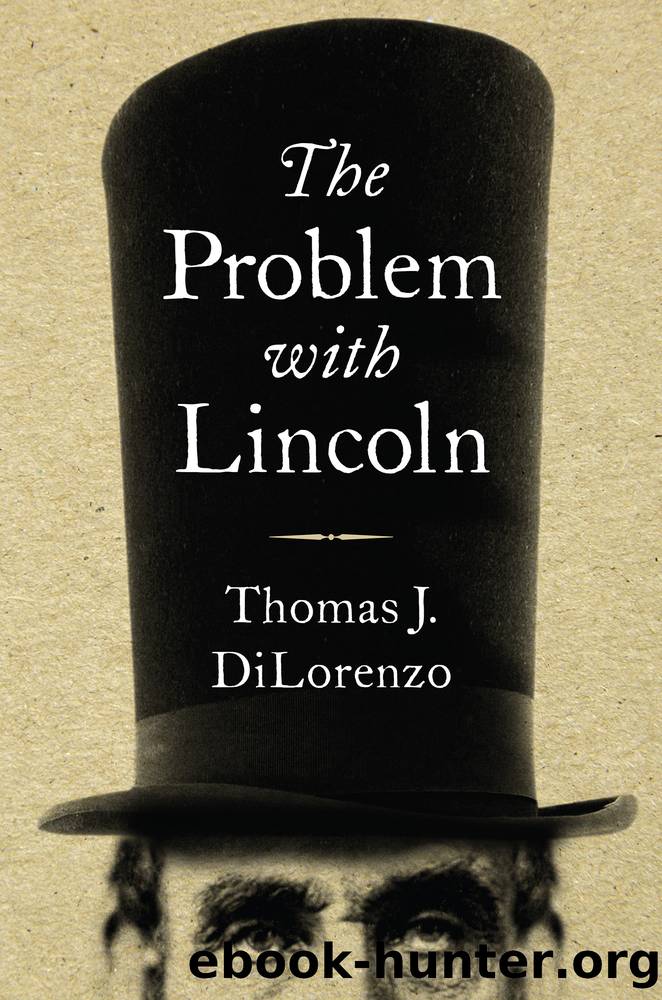The Problem with Lincoln by Thomas J. DiLorenzo

Author:Thomas J. DiLorenzo
Language: eng
Format: epub
Publisher: Regnery History
Published: 2020-07-07T00:00:00+00:00
Lincoln’s Pinocchio-Style Political Rhetoric
The subdiscipline of economics known as “public choice theory” is the study of political decision-making using the tools and theories of economics. Public choice theorists talk about something they call “rational ignorance”: The average citizen spends almost all of his or her time acquiring information for the purpose of living his or her private life—getting through school, doing a job, raising a family, paying the bills, planning vacations, and so forth. Only a tiny portion of the effort to inform oneself is devoted to politics and public policy. Besides, government is so big and pervasive that no human mind could possibly comprehend less than a tiny percentage of all government activities, even if one spent all day studying them. Therefore, it is rational to be ignorant of most of the activities of government.28
Government was much smaller in Lincoln’s day than ours, but the principle of rational ignorance still applied. And it explains why politicians have, from the beginnings of democracy, sought to become experts at obfuscating, misleading, pulling the wool over our eyes, and lying. Democratic politics basically involves politicians’ using the coercive powers of the state to plunder one group of citizens (taxpayers) for the benefit of another, more politically potent group that will in turn support the careers of the politicians doing the plundering. The problem facing all politicians who play this game is that they risk a public revolt if it is widely perceived that what they are all about is plunder. They must therefore devise language that will convince at least a large segment of the public that what they are doing is really in “the public interest.”
The master politician is the one who is the most convincing—who can make the masses believe that higher prices through protectionism are in their best interests, for example, or that a bank run by politicians will not be corrupt, or that taxing hard-working middle-class taxpayers to bail out or subsidize the failing businesses of politically connected millionaires and billionaires is in the public interest. No one was more masterful at this game than Abraham Lincoln. Indeed, that is how he got himself elected president of the United States in the first place. The same can be said of most other presidents.
His rhetoric on the supposedly sacred Union, derived in part from the words of Hamilton, Marshall, Story, and the other nationalists, is one example of Lincoln’s skill in swaying the rationally ignorant public. These ideas may have emanated from the early American nationalists, but Lincoln was ingenious as a secondhand dealer in ideas. His claim in the Gettysburg Address that the North was fighting for government “of the people, by the people, and for the people” has convinced generations of Americans of the righteousness of the Northern cause. And yet, as H. L. Mencken pointed out, “The Union soldiers in the battle actually fought against self-determination; it was the Confederates who fought for the right of their people to govern themselves.”29
Nor was the government created by
Download
This site does not store any files on its server. We only index and link to content provided by other sites. Please contact the content providers to delete copyright contents if any and email us, we'll remove relevant links or contents immediately.
Blood and Oil by Bradley Hope(1566)
Wandering in Strange Lands by Morgan Jerkins(1430)
Ambition and Desire: The Dangerous Life of Josephine Bonaparte by Kate Williams(1394)
Daniel Holmes: A Memoir From Malta's Prison: From a cage, on a rock, in a puddle... by Daniel Holmes(1336)
Twelve Caesars by Mary Beard(1324)
It Was All a Lie by Stuart Stevens;(1300)
The First Conspiracy by Brad Meltzer & Josh Mensch(1174)
What Really Happened: The Death of Hitler by Robert J. Hutchinson(1167)
London in the Twentieth Century by Jerry White(1149)
The Japanese by Christopher Harding(1134)
Time of the Magicians by Wolfram Eilenberger(1131)
Twilight of the Gods by Ian W. Toll(1123)
A Woman by Sibilla Aleramo(1097)
Cleopatra by Alberto Angela(1096)
Lenin: A Biography by Robert Service(1080)
John (Penguin Monarchs) by Nicholas Vincent(1071)
The Devil You Know by Charles M. Blow(1029)
Reading for Life by Philip Davis(1027)
The Life of William Faulkner by Carl Rollyson(993)
